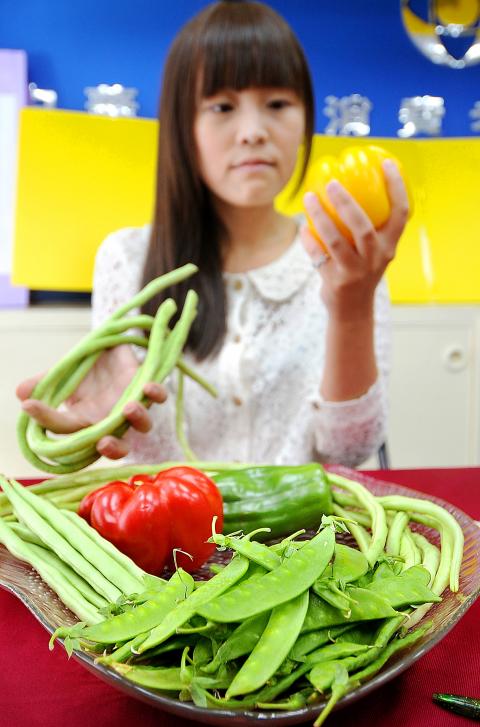The Consumers’ Foundation yesterday said its latest random testing of vegetables for pesticides found that 91 percent of cowpeas, 67 percent of snow peas, 47 percent of string beans and 18 percent of sweet peppers bought in the Greater Taipei area contained excessive amounts of pesticide residues or pesticides that are not allowed.
The survey was conducted in April and May on 49 samples —11 cowpeas, 12 snow peas, 15 string beans and 11 sweet peppers — bought at hypermarkets, supermarkets, traditional markets and organic food stores, the foundation said.
Chen Chih-yi (陳智義), publisher of the foundation’s Consumer Reports Magazine, said 27 samples had pesticide residue exceeding the levels regulated by the Standards for Pesticide Residue Limits in Foods (殘留農藥安全容許量標準) or had banned pesticide on them.

Photo: Fang Pin-chao, Taipei Times
A few samples had as many as eight types of pesticides on them, Chen said.
Ten of the 11 cowpea samples violated regulations, the foundation said. One cowpea sample found with eight types of pesticide carried traces of chlorantraniliprole — which is not allowed to be used on the vegetable — and four other pesticides that exceeded regulated limits, including fenpropimorph residue that was up to 90 times the limit, the foundation said.
Another cowpea sample had four types of pesticide and oxycarboxin residue more than 200 times the regulated limit, the foundation said, adding that it was common for farmers to use several types of pesticides on cowpeas at once.
Cheng Cheng-yung (鄭正勇), member of the foundation’s food commission and a professor of horticulture at National Taiwan University, said because vegetables are often harvested in batches instead of being picked all at one time, various pesticides can accumulate on the plants over time. The used of mixed pesticides could affect consumers’ livers and damage their health, Cheng said.
Buying from organic stores is no guarantee of purity.
The survey said a sweet pepper purchased from an organic food store had six types of pesticides, including one type banned from use on sweet peppers and one type that exceeded the regulated amount.
The foundation said consumers can reduce their pesticide intake by not buying fruit and vegetables based just on their good appearance, buying vegetables in bags, soaking vegetables in water for at least 15 to 20 minutes before cooking, not putting lids on pots when cooking vegetables so pesticide residues can evaporate and not consuming the sauce or water left in a dish of cooked vegetables.
The Council of Agriculture said it would increase inspections on such vegetables and fine farmers who violate the Agro-pesticide Act (農藥管理法) more than NT15,000. It said it would also assist local agencies to establish agricultural product safety self-management mechanisms.
The council said it would hold at least 100 workshops in major vegetable production areas to instruct farms on appropriate pesticide usage, adding that farmers who do not attend the workshops would be a priority in future pesticide inspections.

Japanese footwear brand Onitsuka Tiger today issued a public apology and said it has suspended an employee amid allegations that the staff member discriminated against a Vietnamese customer at its Taipei 101 store. Posting on the social media platform Threads yesterday, a user said that an employee at the store said that “those shoes are very expensive” when her friend, who is a migrant worker from Vietnam, asked for assistance. The employee then ignored her until she asked again, to which she replied: "We don't have a size 37." The post had amassed nearly 26,000 likes and 916 comments as of this

Taiwanese can file complaints with the Tourism Administration to report travel agencies if their activities caused termination of a person’s citizenship, Mainland Affairs Council Minister Chiu Chui-cheng (邱垂正) said yesterday, after a podcaster highlighted a case in which a person’s citizenship was canceled for receiving a single-use Chinese passport to enter Russia. The council is aware of incidents in which people who signed up through Chinese travel agencies for tours of Russia were told they could obtain Russian visas and fast-track border clearance, Chiu told reporters on the sidelines of an event in Taipei. However, the travel agencies actually applied

US President Donald Trump said "it’s up to" Chinese President Xi Jinping (習近平) what China does on Taiwan, but that he would be "very unhappy" with a change in the "status quo," the New York Times said in an interview published yesterday. Xi "considers it to be a part of China, and that’s up to him what he’s going to be doing," Trump told the newspaper on Wednesday. "But I’ve expressed to him that I would be very unhappy if he did that, and I don’t think he’ll do that," he added. "I hope he doesn’t do that." Trump made the comments in

Tourism in Kenting fell to a historic low for the second consecutive year last year, impacting hotels and other local businesses that rely on a steady stream of domestic tourists, the latest data showed. A total of 2.139 million tourists visited Kenting last year, down slightly from 2.14 million in 2024, the data showed. The number of tourists who visited the national park on the Hengchun Peninsula peaked in 2015 at 8.37 million people. That number has been below 2.2 million for two years, although there was a spike in October last year due to multiple long weekends. The occupancy rate for hotels